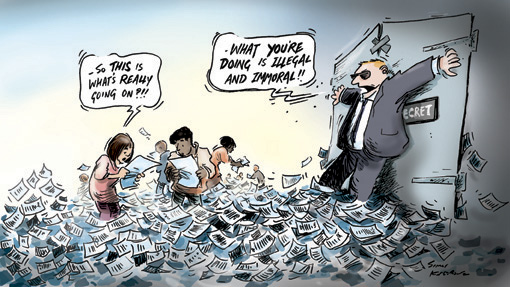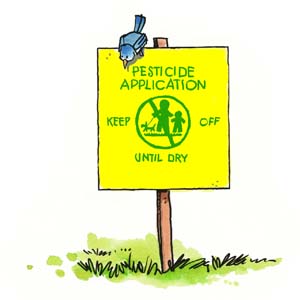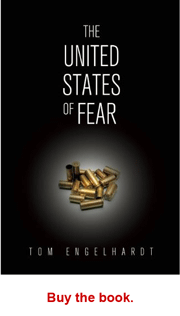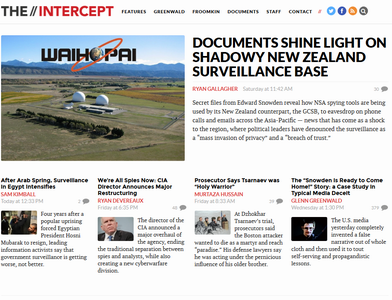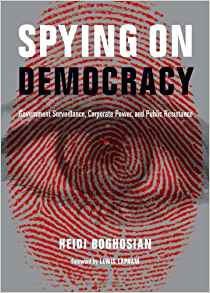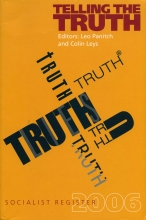Other Voices: The Connexions Newsletter
July 22, 2017
This Issue: Secrecy and Power
It is one of the essential attributes of power that it insists on secrecy. Or, more precisely, those who wield power over others routinely claim that the details of what they do, and why they do it, are far too sensitive to be revealed to the public. The decisions they take, the discussions they have, the information they consider, the lobbyists who influenced them: all this must remain behind closed doors. Terrible (though unspecified) calamities would result if their jealously guarded secrets were to be revealed.
Self-serving as this view may be, it contains an important germ of truth. It is a defining characteristic of almost all bodies that wield power – governments, public agencies, courts, police, corporations – that they view the people they ostensibly serve as the enemy. If the public finds out that they are seen as the enemy, the interests of the power-holders could indeed be harmed. Having their secrets exposed to the public is seen as an existential threat, and is met with fury: witness, for example, the extraordinary vindictiveness which the American state directs at whistleblowers like Edward Snowden, Chelsea Manning, and Julian Assange.
It is on the level of national security that the cult of secrecy is most apparent and most pathological. It is also on this plane that the distinction between secrecy and privacy is clearest.
Privacy is something that belongs to individuals. It is the right to go about one’s business without being spied on by the state or corporate entities. Governments and corporations hate the idea of privacy, and do everything they can to deny anyone, anywhere, the right to privacy. They suck up information, all kinds of information, anything and everything, and trade it like a commodity.
Secrecy, on the other hand, is a weapon used by the state and other wielders of power against the public they ostensibly serve. Whereas everything that every member of the public does must be subject to surveillance by those in power, everything important done by those in power must remain a secret.
The same attitudes are prevalent wherever power is wielded. Far-reaching international agreements, such as the so-called “free trade” deals, are always negotiated in secret. Pesticides and other chemicals are routinely approved on the basis of ‘evidence’ which can’t be revealed because it is a trade secret. On those rare occasions where corporations are successfully sued by those they have harmed, the actual settlement is concealed behind a court-imposed non-disclosure clause, so that others can’t take advantage of the precedent. International financial agreements have been carefully crafted to allow the wealthy to move and hide their money to avoid paying taxes. Trials of those accused of crimes against the state are held in secret; sometimes those taken into custody are held in secret prisons without even the benefit of a trial.
One of the paradoxes of the cult of secrecy, as it pertains to national security, is that very often it doesn’t work. Security agencies, with their thousands of employees and their billions of intercepted communications and storehouses full of secrets, routinely fail to foresee events which journalists and ordinary observers on the ground see, analyze, and understand without access to any secret information.
But then, it would be naive to think that the goals those in power claim to be pursuing are their real goals. Wars are profitable. Trade deals are profitable. Toxic chemicals are profitable. Keeping the real enemy -- the people – from interfering is essential. And therefore, so is secrecy.
As always, we invite you to share this newsletter with your friends. You can forward this email, or send them the link to the Other Voices home page on the Connexions website at www.connexions.org/Media/CxNewsletter.htm.
If you'd like to subscribe and receive this newsletter by email every two weeks, please use this form.
Your feedback is appreciated - and so are donations to keep us doing what we're doing!

Topic of the Week
Secrecy
It’s no secret that governments, corporations, and other organizations like to keep the public from knowing the details of what they are really doing. But there are also those who work at exposing the secrets of the rich, the powerful, and the corrupt (including cartoonist Simon Kneebone - simonkneebone.com – whose cartoon appears on the left). Explore the world of secrets and secrecy via the Connexions Subject Index here
This Week on Connexions.org
The Secret Secret
by Jimmy Johnson
Only those with proper clearances can participate in discussions that affect significant aspects of our lives. Certain technological achievements, our collective ethical decisions (torture, secret prisons, air strikes, etc.), our collective behavior towards other nations and peoples (foreign policy discussions) and more are often obscured by state secrecy. Like the medieval clergy, those holding classified clearances are the sole legitimate interpreters of the 'really important' knowledge. In effect, they are a caste that guides our political and technological cosmologies. Read more
Secrecy for Sale: Inside the Global Offshore Money Maze
A large-scale investigation by the International Consortium of Investigative Journalists exposed some of the ways in which corporations and wealthy individuals hide their wealth to avoid paying taxes. The investigation showed that:
* The mega-rich use complex offshore structures to own mansions, yachts, art masterpieces, and other assets, gaining tax advantages and anonymity not available to most people.
* Many of the world's top banks have aggressively worked to provide their customers with secrecy-cloaked companies in the British Virgin Islands and other offshore hideaways.
* A well-paid industry of accountants, middlemen and other operatives has helped offshore patrons shroud their identities and business interests, providing shelter in many cases to money laundering or other misconduct.
Keywords: Tax Havens - Secrecy
Abandoning the public interest
Key evidence in EU's risk assessment of glyphosate must not remain 'trade secret'
The chemical industry and the European Food Safety Authority are refusing to disclose key scientific evidence about glyphosate's risks, citing 'trade secrets' protection, writes Corporate Europe Observatory. They must be compelled to publish the 'mysterious three' studies EFSA used to assess glyphosate as 'unlikely' to cause cancer to humans - contradicting the IARC's view. Read more
Keywords: Agricultural Chemicals - Chemical Industry
Fighting Secrecy and the National Security State
An Interview With Birgitta Jonsdottir, the Co-Producer of WikiLeaks's "Collateral Murder" Video, on the status of the international struggle against government secrecy and surveillance. Governments get away with committing crimes, she says, because they are protected by a wall of secrecy. Whistleblowers can expose those crimes when they see them being committed. Read more
Keywords: War Crimes - Whistleblowers
Mistaking Omniscience for Omnipotence
Tom Englehart says that, given how similar they sound and how easy it is to imagine one leading to the other, confusing omniscience (having total knowledge) with omnipotence (having total power) is easy enough. It’s a reasonable supposition that, before the Snowden revelations hit, America's spymasters had made just that mistake. If Snowden’s leaks have taught us anything, however, it should be this: omniscience is not omnipotence. At least on the global political scene today, they may bear remarkably little relation to each other. In fact, at the moment Washington seems to be operating in a world in which the more you know about the secret lives of others, the less powerful you turn out to be. Read more
Keywords: National Security - Privacy
Website of the Week
The Intercept
The Intercept is an online publication launched in February 2014, edited by Betsy Reed, Glenn Greenwald, and Jeremy Scahill, which serves as a platform to report on the documents released by Edward Snowden in the short term, and "to provide aggressive and independent adversarial journalism across a wide range of issues, from secrecy, criminal and civil justice abuses and civil liberties violations to media conduct, societal inequality and all forms of financial and political corruption." Find them here
Keywords: National Security - Security and Surveillance
Books of the Week
Spying on Democracy: Government Surveillance, Corporate Power, and Public Resistance
By Heidi BoghosianHeidi Boghosian documents the disturbing increase in surveillance of ordinary citizens and the ways in which it undermines privacy, civil liberties, and what remains of democratic institutions. Boghosian reveals how technology is being used to categorize and monitor people based on their associations, their movements, their purchases, and their perceived political beliefs. She shows how corporations and government intelligence agencies mine data from sources as diverse as surveillance cameras and unmanned drones to iris scans and medical records, while combing websites, email, phone records and social media for resale to third parties, including U.S. intelligence agencies. Read more
Keywords: Privacy - Surveillance
Telling the Truth: Socialist Register 2006
Telling the Truth is a collection of essays that examines the difficulties of illuminating the degenerative and secretive nature of public life. According to the editors, the greatest threats to governmental legitimacy are the pressures of market forces caused by global neoliberalism and its consequences: social dislocation and ecological degradation. These "legitimacy problems" manifest within public life in the forms of secrecy, ambiguous communication and dishonesty. For example, today governments use the pretext of the "war on terror" to hide their actions from the public and withhold information, routinely label basic information as "sensitive" and enact drastic laws to validate state surveillance of citizens. The editors argue that this is only one example of a larger problem. Thus, the rarity of "plain speaking politicians," the compromise of journalistic professionalism, the corporate sales-pitch mentality pervading all factors of life and the increasingly commercial nature of scientific research are all evidence of the general disregard for truth in public life. Despite this gloomy reality, the editors suggest that this degenerated discourse can be both challenged and reversed. Read more
Film of the Week
Breaking The Silence: Truth And Lies In The War On Terror
This film by John Pilger was screened six months after the invasion of Iraq in March 2003 and two years after the invasion of Afghanistan in October 2001. The film dissects the truth and lies behind the 'War on Terror', investigating the discrepancies between American and British justification for 'war' and the facts on the ground in Afghanistan and Washington DC. Pilger explains that US actions have nothing to do with fighting terrorism but are instead part of an opened-ended war for global dominance and control of valuable oil resources in the Middle East. The real danger facing humanity, he says, is the increasingly aggressive military action of American imperialism and the state terrorism orchestrated by the White House. He asks: "What are the real aims of this war and who are the most threatening terrorists? Who is responsible for far greater acts of violence than those committed by the fanatics of Al-Qaeda, crimes that have claimed many more lives than September 11th and always in poor, devastated, faraway places? "This film", he says, "is about the rise and rise of rapacious imperial power and a terrorism that never speaks its name - because it is our terrorism." See
Keywords: State Terrorism - Terrorism
Organizing
Ten Principles to Guide the Young Activist: Finding Happiness in Helping Others
They say people who live for a higher cause are happier than those who don’t. May you always find your happiness in alleviating the pain of others by standing up for what is right and honorable. Read more
Keywords: Activism - Organizing for Social Change
People's History
Davis Day: Coal Miners & Community Connection
On May 9 this year in Pictou County, Nova Scotia, people gathered together to honour the 26 miners who lost their lives in 1992 when the Westray mine exploded in Plymouth in the early hours of the morning. Twenty-five years later, people in Pictou County and across Canada were reminded of the burden of sorrow carried by coal mining communities everywhere. We share a heritage of lasting grief: of bodies damaged and lives lost doing dangerous work underground. We also share a history of community connection. Read more
Keywords: Coal Mining - Workplace Death & Injury
From the Archives
The British Camps
Today, the expression 'concentration camp' evokes the horrors of Nazi Germany, conjuring up black-and-white images of Auschwitz and Belsen. But Germans were neither the first nation to make use of concentration camps nor the last. The British were early adopters of these exceedingly useful establishments. During the Second Boer War (1899-1902), they set up a network of camps in which conditions were so grim that over twenty-two thousand children under the age of sixteen died of starvation and disease. During World War I, the United Kingdom used concentration camps to control those they could not or would not bring before the courts: men who had committed no offense besides belonging to the wrong nationality or ethnic group.
Both during and immediately after World War II, concentration camps and slave-labour camps operated throughout the United Kingdom. A year after World War II’s end, British agriculture only functioned thanks to slave labour. In May 1946, 385,000 enslaved workers were held behind barbed wire across the British Isles; thousands more were arriving every week. Read more
Keywords: Concentration Camps - Forced Labour
Connexions Calendar
July 21 – 23, 2017
Labor Fightback Conference
For the labor movement, business as usual is no longer an option. The jury is in; the verdict is unanimous. It has been proven beyond a reasonable doubt that what the labor movement has been doing is no longer working.
July 25, 2017
Any Other Way Readings Series #4: Scenes and Spaces
Join us and the fine folx at Glad Day Bookshop as we host the Any Other Way Reading Series. Each Tuesday in July, we'll feature Any Other Way: How Toronto Got Queer's contributors who are also some of the city's biggest and brightest voices on queer culture - past, present and, and future.
August 1 – 7, 2017
World Breastfeeding Week
World Breastfeeding Week is celebrated every year from 1 to 7 August in more than 170 countries to encourage breastfeeding and improve the health of babies around the world.
August 9, 2017
International Day of the World's Indigenous Peoples
Celebrating Indigenous people and recognizing their value and human rights.
August 17 – 19, 2017
Turbulent Times
The People's University is a forum for learning, teaching and debate that is open to people both within and outside the academic world, young and old alike. A wide range of global and local issues of current interest will be discussed in workshops, plenary sessions, movement assemblies and social events, all aimed at building bridges between students, community activists, trade union activists, workers, retirees, artists, and others participants in this stimulating event.
The Connexions Calendar is an online calendar that exists to advertise events that support social justice, democracy, human rights, ecology, and other causes. We invite you to use it to promote your events. Adding events to the Connexions Calendar is FREE. We’ll give you a username and password which you use to log on. Use the contact form to arrange for a username and password.
Seeds of Fire
July 16, 1979
Navajo land and water contaminated
The largest release of radioactive material in U.S. history occurs in the territory of the Navajo Nation. More than 1200 metric tons of uranium tailings (mining waste) and 378 million litres of radioactive water burst through a mud containment dam near Church Rock, New Mexico. The spill contaminates the Rio Puerco river, source of drinking water for the Navajo, showing 7,000 times the allowable standard of radioactivity for drinking water.
July 17, 1979
Sandinista revolution
Fighters of the Sandinista National Liberation Front overthrow the U.S.-supported dictatorial regime of Anastasio Somoza in Nicaragua and force him to flee the country. The notorious and feared U.S.-trained National Guard crumbles and its surviving commanders negotiate a surrender, despite their superiority in armaments.
July 19, 1953
Vorkuta uprising
Prisoners in the Vorkuta forced-labour camp in the Soviet Union rebel. Some prisoners refuse to continue working; the walkout quickly spreads to other camps in the complex. Some 18,000 prisoners participate in the rebellion. After two weeks, troops move in, killing around 60 prisoners and injuring many more.
July 23, 1846
Thoreau goes to jail
Henry David Thoreau is jailed for refusing to pay the poll tax as a protest against the American war against Mexico. He goes on to write “Civil Disobedience,” an essay that became a source of inspiration for Leo Tolstoy, Mohandas Gandhi, and Martin Luther King, Jr.
From Thoreau’s essay: “Unjust laws exist: shall we be content to obey them, or shall we endeavour to amend them, and obey them until we have succeeded, or shall we transgress them at once?”
July 26-29, 1830
Revolt in Paris
Unhappy with the results of the recent election, French King Charles X dissolves Parliament. In response, Paris workers head to the barricades, while soldiers refuse to put down the insurrection. Three days later, the King is forced to abdicate.
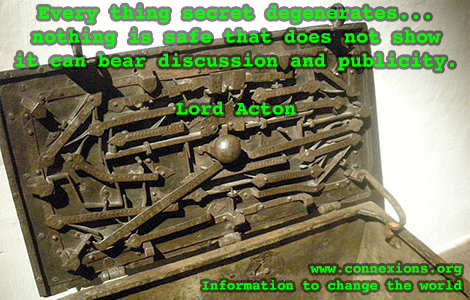
Your support is needed to keep Connexions going
All of the work of the Connexions project is done by volunteers, but our expenses include rent, phone and computer costs and technical support, as well as expenses related to our ongoing project of converting printed archival materials into digital formats. You can make a one time or regular monthly contribution through the donate page on the Connexions website.
Bequests
Many of us have made working for social justice a lifetime commitment. If you are thinking about leaving a legacy for social justice that will live on, you might want to consider leaving a bequest to Connexions in your will. If you'd like to discuss this option, please contact us or see the Bequest page.

